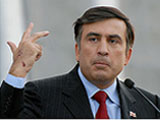Saakashvili, a costly ally
By Andrew D Bishop for ISN
"You've got a solid friend in America," President George W Bush once told Georgian President Mikhail Saakashvili. And to an extent, this assertion remains true to this day.
Yet, what seemed like a smart-minded alliance just a few years ago has come to need some close scrutiny if the US is to keep upholding the liberal and democratic values it so cherishes.
Back in the days when he began running for president against Edward Shevardnadze, Saakashvili had all the attributes the White House sought in a foreign politician, including a top US education and an impressive track record of interest in human rights protection and anti-corruption.
Hence Washington's decision to hop on board and bury Tbilisi's old incumbent statesman when world-famous financier and philanthropist George Soros decided to back the young political maverick during Georgia's 2003 presidential campaign.
Shevardnadze had been a good partner, but Saakashvili would be a better one - so the mantra went at the time.
With the construction of a major Russia-circumventing pipeline having just started at the time of Georgia's November 2003 election, it was essential for the US to ensure that Tbilisi's stance would be lastingly and unfalteringly pro-western - something the young president clearly delivered on for many years.
Nevertheless, the honeymoon Washington has enjoyed with its Georgian mate since the Rose Revolution should have ceased a year ago almost to the day when Saakashvili headed down the slippery slope of authoritarianism.
Instead, through an impressive show of support that might have appeared like a mere excuse for engaging in a short but cathartic session of Russia-bashing, the Bush administration this summer demonstrated that its sole intention was to further cuddle with its controversial regional ally.
As Tbilisi's friend, there is a case to be made for Washington's initial decision to stand by Saakashvili in August, when Georgia launched a military operation in breakaway South Ossetia, but now that Russian troops have returned to their positions, it is well past time the White House began reining in its hot-headed ally. Failing to do so would represent both a moral and strategic mistake.
Just a few days into his confrontation with Moscow, Saakashvili understood that his only chance of defeating Russia would be to rally the West to his cause through a roaring media offensive that would include publishing incendiary external pageeditorialscall_made with one invariable external pagemessagecall_made: "This war threatens not only Georgia but security and liberty around the world."
Yet the troubling aspect of Saakashvili's message was that the increasingly authoritarian style with which he has governed his country over the past year seemed to indicate that he himself had ceased to believe in the sacrosanct principles of freedom and democracy.
In November 2007, four years after winning his first presidential election, Saakashvili used brute force to break up demonstrations in denunciation of his government's corruption, and declared a nationwide state of emergency, thereby radically limiting freedom of information and of expression.
When he was re-elected just a few months later, the young political vindicator was accused of tainting the results that gave him an overwhelming victory against all opposition candidates.
While popular rallies formed to demand a run-off, even the very politically correct Organization for Security and Cooperation in Europe (OSCE) external pagedeclaredcall_made that "serious problems were observed during the vote count" and that a range of other irregularities "were not conducive to increasing public confidence."
Georgia's human rights ombudsman, Sozar Subari, is also external pagereportedcall_made to have "charged that the ruling elite routinely cites the imperative of building a strong state as justification for trampling on individual rights" - a warning that echoes those of anxious opposition members who worry about their leader's desire to adopt a "US-style Patriot Act" to curb Russian influence.
For all his indisputable qualities as a statesman and reformer, Saakashvili isn't to the taste of everyone and seems to upset quite a few of his people's representatives who have external pagecalled for his resignationcall_made.
Realists will argue that Russia's resurgence and the lack of a better alternative have left the US no choice but to stick with Saakashvili.
If not a moral choice, then it must be a strategic one.
However, this argument is weak as it assumes a leader's pro-western penchant is enough to make him an asset when history has proven to those who want to hear it that being associated with a tainted leader is no recipe for success.
From Iran to Afghanistan, the US needs Russia, which isn't to say Washington should bow to Moscow's most eccentric demands in exchange for support, but that beginning a second Cold War over the irresponsible behavior of one rogue ally would undoubtedly prove a mistake of historical significance - one Saakashvili has been trying to lead the West into.
The current king of the castle in Tbilisi has done little to secure western interests in the region, and that Saakashvili's promised democratic dream of a "second Rose Revolution" has yet to occur.
True allies control each other and Georgia's president has proven that he knows how to influence his friends in Washington and Brussels. Now the US and its partners need to send their friend the message that he does not have carte blanche to destabilize the Caucasus or to coerce his fellow countrymen into standing behind him.
Saakashvili is no dictator. But the White House needs to make sure he is not allowed to become one.

